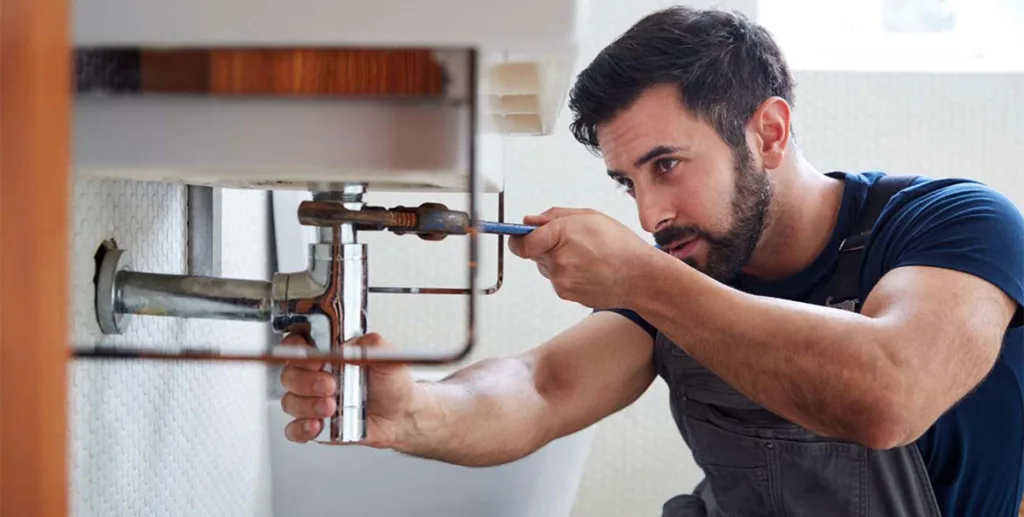SEO for plumbers: 6 ways to boost your online presence
In today’s tech-led world, when someone has a plumbing problem, they’ll likely look for local plumbing services online. So for a small business owner in the hugely competitive plumbing industry, improving your online presence should be a top priority—and the key to that is search engine optimization (SEO).
Learn what SEO for plumbers is and why it’s crucial for attracting new customers. Plus, discover four key areas where working on your SEO can make a difference to your plumbing website traffic— and your bottom line.

What is SEO for plumbers?
In a nutshell, SEO for plumbers helps potential customers find you when they search for local plumbing services. As a form of online lead generation, SEO has become an essential part of any business owner’s digital marketing strategy.
Searchers usually start by typing keywords that describe what they’re looking for into a search engine like Bing, Yahoo, Google Search, or DuckDuckGo. The search engine algorithm then runs in the background, arranging the results for that search.
Listed above the search engine results pages (SERPs) are the paid results. You can get your plumbing business listed here using a paid advertising strategy, like a pay-per-click (PPC) campaign.
Underneath the paid results are the unpaid, organic search results—organic traffic can’t be bought. Results are arranged according to a variety of ranking factors, like relevant keyword use, the credibility and accuracy of the information on a website, and many other more technical SEO elements.
6 ways to improve SEO for plumbers
Most searchers don’t look beyond the first page of SERPs, so your goal is to get your plumbing business to rank as high as possible on the first results page. Here are six effective methods plumbers can use to improve their SEO.
1. Start with keyword research for your local plumbing business

An essential first step in your online marketing strategy is to figure out the local search terms you want to rank for. This will become part of your keyword strategy.
To figure out the most relevant search terms, think about the plumbing services you most often get called for. You also know that your clients will be looking for a local plumber, so include your local service area as part of your local SEO keyword strategy. For example:
- Broken water heater Seattle
- Leaking washing machine Tucson
- Fix burst pipe Memphis
- Bakersfield shower installation
- Find water leak Georgetown
- Oak Park blocked storm drain
If you get stuck, there are many free keyword research tools available online to help you generate more ideas for plumbing SEO keywords. Once you have your local business keywords, include them naturally throughout your own website content. This is known as on-page SEO.
2. Create separate SEO-optimized service pages on your plumbing website
One obvious place to include your plumbing SEO keywords is on your homepage. But just as importantly, they need to appear on your service pages too.
Create a separate webpage for each service you provide and use the relevant keywords on that page. Also include keywords in your HTML title tags and meta descriptions for each page, as these tell search engines exactly what’s on that page. For example, you may have landing pages for:
- Leak location
- Burst pipes
- Blocked drains
- Appliance plumbing repair
- Sewerage problems
- Water heater installation and repair
Having separate service pages helps potential customers easily find the information they’re looking for on your plumbing website, which is an important aspect of the user experience. It also helps to get each of those service pages ranked separately on SERPs, increasing the chances that searchers will click through to your site.
Make sure that other important information like your contact details, opening hours, and location on Google Maps is clearly displayed, along with answers to frequently asked questions (FAQs). Include a call to action that invites potential clients to contact you for a free quote.
If web design isn’t your forte, consult your webmaster or another website developer. They can also help you with important search ranking factors like page speed and mobile phone responsiveness.
3. Pay close attention to your business platform listings
Many people search for local services on online business platforms. For example, 76 million people visit Yelp each month looking for local businesses.
After you add or claim your Yelp Business Page, optimize it as much as possible. First, make sure you write your business name, address, and phone number (NAP for short) exactly the same way you do on your website—and every other site where your NAP appears. The accuracy and consistency of this information across all platforms is an important ranking factor for search engines.
You should also add your website link, business hours, and high-quality images to give potential clients (and search engines) the information they need to verify that you’re a legitimate company. For example, you could display images of your team or before-and-after photos of successful jobs you’ve done.
Yelp also provides space for customers to leave reviews of your plumbing business—and positive reviews are another ranking factor when it comes to SEO for plumbers on search engines.
Get found for free
Show up for any of the millions of customers on Yelp searching for a business like yours.

4. Include keywords in your social media and content marketing
Continue your SEO campaign by including keywords in all your plumbing company social media and any other content marketing.
If you write posts for social media, include the keywords wherever you can in your business profile, as well as in your post copy and photo captions. If you’re posting videos, keep them short and include keywords in the video title, meta tags, description, and the audio itself. If you write longer blogs, include your keywords in section headers and meta tags, as well as in the content itself. Then publicize your videos and blogs on your social media platforms.
For example, you could put together a series of tips that highlight your services—while still providing helpful information—with headings like:
- What to do when your washing machine floods
- 3 things to check when your toilet won’t flush
- 5 signs you need a professional plumber
- 6 potential plumbing issues to check before you buy a house
Aim to provide helpful information while raising brand awareness, educating your audience, and showing that you’re an expert in your field. For more ideas on what people want to know, have a look at Answer The Public.
It’s worth noting that search engines also check that the content you provide is high quality, relevant to what you’re offering, and consistent. As such, make sure that you maintain a regular publishing schedule, whether it’s once a day, once a week, or once every two weeks.
5. Generate plumbing links from other people’s sites

While on-page SEO is about your own website, off-page SEO relates to how you show up on other websites. This is important because every time another website mentions your brand and links back to your website (this is called a backlink), search engines give you points for credibility and authority.
You don’t have complete control over other people’s platforms—but there’s a lot you can do to encourage link-building citations. For example:
- Register for professional plumber directories in your area, sharing your website details
- Join your local chamber of commerce and get your business on online lists of local services
- Sponsor a local charity so your business is mentioned on their website
- Whenever you publish useful content, encourage your audience to share links to it with their network
- Write a press release and share it with news agencies, with a link back to your site
- Offer to write a guest post or record a guest video for related companies, like DIY websites, plumbing supply companies, or real estate agents
As a bonus, whenever someone new follows a backlink to your site, you’re expanding your audience, raising brand awareness, and generating a potential new lead.
6. Consider hiring an SEO services expert
Although there’s a lot you can do yourself, managing SEO can be time-consuming—and it’s ongoing. If you have the budget for it, consider hiring a content management company or marketing agency. Otherwise, you can look for an SEO expert on sites like Fiverr or Upwork for more affordable options.
SEO companies also keep an eye on your metrics using tools like Google Analytics to make sure the strategy you’re using is as good as it can be. You’ll know it’s working when you start to get more phone calls and emails from potential clients who found you online.
Planning a plumber SEO strategy to stand out from the crowd
Help potential customers find you amid strong online competition by optimizing your website for search engines. SEO for plumbers starts by identifying the keywords that customers use to search for your plumbing services. Use these across your website as well as your blogs and social media.
Create separate webpages for each service you offer and optimize your SEO on each of them as well, and pay close attention to your listings on online business platforms, ensuring that all your information is accurate and authoritative.
Also, make sure your name, address, and phone number are written accurately and consistently across all your platforms and any others where they appear. Then aim to create as many backlinks from other credible sites as possible.
All these actions help to improve your search ranking and attract more customers to your plumbing business. Once you’ve won new business, learn how to use word-of-mouth to build your customer base even further with a referral marketing program.